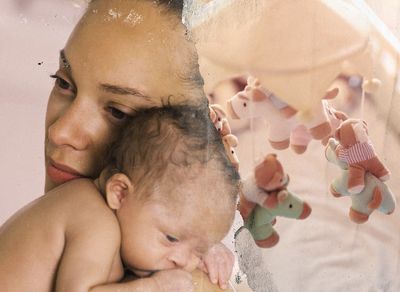Surrogacy Is Complicated—Then Add a Global Pandemic
In Ukraine, COVID-19 has left surrogates trapped and newborns abandoned.
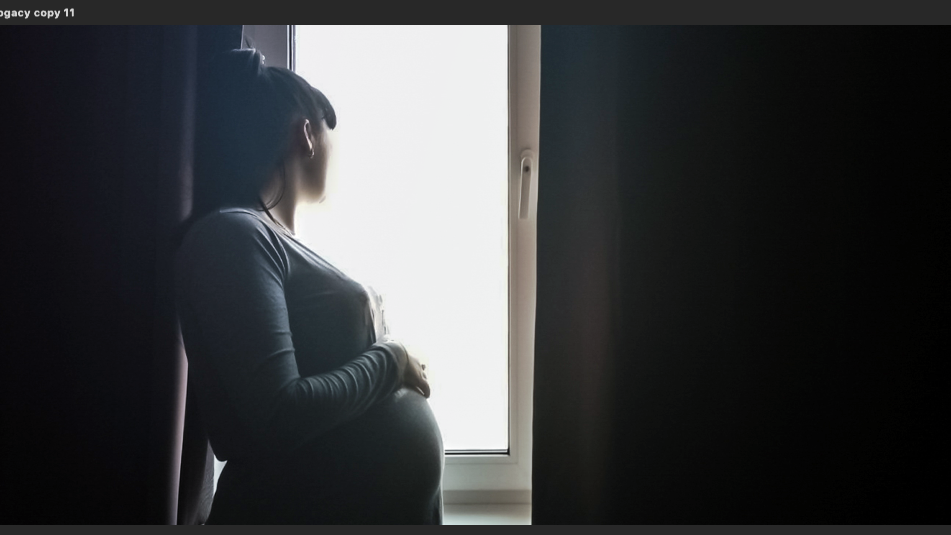
'Arina* is a 28-year-old surrogate who has been quarantine in Kiev, 400 miles from her family, since early March.'
This article is a partnership between Marie Claire and The Fuller Project.
At 37 weeks pregnant, Arina* doesn’t leave her Kiev apartment often. The pandemic ricocheting around the globe means the 28-year-old surrogate can't ride the now-closed subway or tram to the city center. To pass the time, she sticks to a daily routine of morning calisthenics, porridge, and TV in the three-bedroom apartment she shares with two other surrogates. Stranded on the 25th floor, in a white wallpapered apartment, facing another row of grey apartments, Arina leaves only to take short walks through the neighborhood or to sneak in an occasional ice cream run to the local supermarket.
The Ukrainian mother of two hasn’t seen her own children since early March. Two months ahead of her due date, Lotus, the Israel-registered surrogacy company that matched Arina with a foreign couple, wanted her to see their appointed doctor and to monitor the second-time surrogate’s baby closely. Just as the coronavirus seeped across Europe, Arina left her 4-year-old and 7-year-old daughters at home with her partner in Melitopol, 400 miles southeast of the capital, and took a 12-hour overnight train to the Pozniaky neighborhood on the Dnieper River. She writes fairy tales for her girls, though she doesn’t speak to them often. It makes all of them sad to be so far apart for such an uncertain amount of time. Now in the last days of her pregnancy, she feels trapped, confined to the small world of her apartment. She doesn’t have the energy to make up happy endings.
"I want to feel some positive emotions but there are none,” she says.
While statistics aren’t official, it’s estimated that in 2019, hundreds of babies were born in Ukraine each month through large surrogacy agencies, according to a representative from the Medical and Reproductive Law Center in Kiev. This year, as the country enters a third month of COVID-19-related restrictions and remains locked down, there are likely, again, hundreds of babies being born to surrogates. Parents from France, Australia, China, Spain, the United States, and Israel are trying to get to Ukraine or are stranded in the country with their newborns.
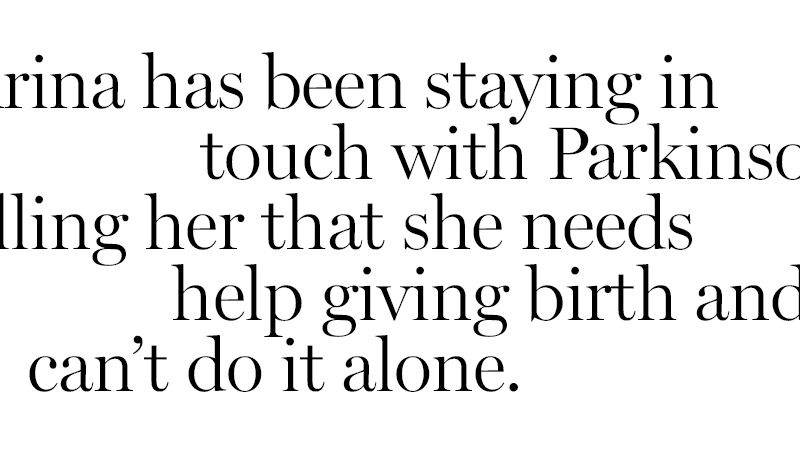
Since countries across Asia banned surrogacy in 2015, citing exploitation of the system by foreign couples and abuse by agencies, Ukraine’s industry has thrived. Most European Union countries ban commercial surrogacy, though legislation and reasoning vary by country. In Germany and France, for example, surrogacy is seen as disregarding the dignity of women.
But surrogacy has become popular in Ukraine—both for foreign women who want children of their own at a lower cost than in the United States and for local women who are drawn to the work by promises of payments more than three times Ukraine’s average salary. Arina made around $300 a month as a taxi caller and by selling clothes online; once the baby is born, she will receive a $15,000 payment from the parents, an amount of money she needs to support her family now more than ever. Since the start of coronavirus-related stay-at-home orders, more than a million Ukrainians have lost their jobs, according to the Ukrainian Chamber of Commerce and Industry. The money will allow her to buy a home for her family and find a sense of economic stability.
Get exclusive access to fashion and beauty trends, hot-off-the-press celebrity news, and more.
Twelve days after Arina made the temporary move to Kiev, Ukraine closed its borders to foreigners. The baby’s French mother isn’t sure she will make it to meet her child when he enters the world this month. Lotus, the surrogacy agency Arina works with, did not respond to repeated requests for comment about the procedures in place for babies whose parents won’t be able to meet them at birth.
However, another Ukraine-based surrogacy agency BioTexCom, one of the largest in the country, connected Marie Claire with nannies currently taking care of 62 babies (and counting) at the Hotel Venice on the outskirts of Kiev. BioTexCom has owned and operated the hotel since 2016. There, BioTexCom–employed nannies like Olha Kuts watch over parents and babies, teaching families how to bathe, feed, and change their newborns. Before the pandemic, parents would spend time with their newborns at the hotel, sometimes leaving them with nannies for short breaks. Now, under new company protocols input as the coronavirus spread to Ukraine, Kuts’s job has taken on an exhausting, new dimension. She doesn’t leave the hotel, eating and sleeping there between long hours spent minding babies whose parents are countries away.
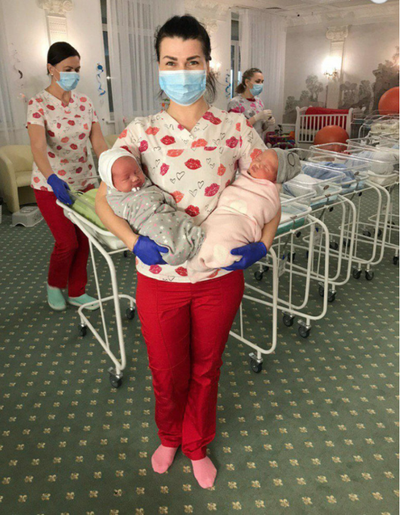
'A promotional photo posted on BioTexCom’s website. The Ukrainian surrogacy agency has, by its own admission, been accused of trafficking in the past. '
“Babies are here around the clock,” says Kuts, 34, part of a team of nurses watching more than two dozen children born to parents from France, Germany, China, Spain, and Romania, among other countries. When the nannies do get time off, they are fully isolated from the outside world. After overnight shifts, Kuts, who has worked with the company for two-and-a-half years, is granted a three-hour nap. Then, she must return to work. There’s too much work to be done, her manager tells her. It was unclear if she was being monitored by a company agent as she spoke with Marie Claire.
The company posted promotional pictures to its website, even advertising that they have reduced the fee for child care from 50 Euros to 25. In one photo, seven nurses pose behind 14 clear, plastic cribs lined up in three rows with babies wrapped in lime green, blue, and pink blankets. In another, a happy-looking nurse poses for the camera, holding a pair babies in her arms. In each picture, the nurses wear light blue masks and dark blue gloves.
Sophie Parkinson, the 30-year-old mother to the baby Arina carries, has, like many intended parents, been searching the web for any information on what happens to babies born via surrogate during this lockdown. She found the photos BioTexCom has put out but can’t bear to look at them. She’s heard there’s a video, too, of nannies cradling newborns, cooing to them to sleep. Parkinson had come to terms with her own infertility after years of trying to have a baby. She was just weeks away from holding her own.
“To see newborn babies waiting in cribs for their parents to pick them up because they are not here was too hard. I don’t want to look at that,” she says via phone from Cormeilles, a small town in Normandy.
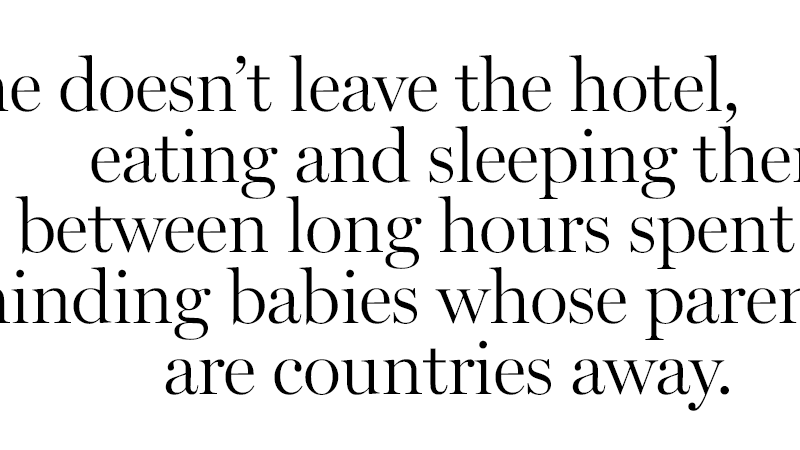
She flew from Brisbane, Australia, to France, where she has family, trying to get to Kiev in time. But everything happened too quickly: Ukraine closed its borders. Her days are filled with phone calls, texts, and emails, strategizing ways to make it to Ukraine in time for the birth. “I am trying to reach out to French embassies, the Ukrainian embassy in France, the French government, other French intended parents, so that we can build a case, and find out what we have to do. So that we can get authorized to get to Kiev,” she says.
In the time of coronavirus, dozens of families are in the same predicament, says fertility lawyer Natalie Gamble at NGA Law. As coronavirus began to spread, she told Marie Claire: “In a few weeks there might be children born whose parents won’t be able to get to Ukraine because of the travel restrictions.”
Arina has been staying in touch with Parkinson, telling her she needs help, that she needs help giving birth and can’t do it alone. The two women text daily via Viber. Lotus allows contact between surrogates and parents, though many agencies do not. “Everybody is very scared. The uncertainty is very hard for our emotional state,” says Parkinson. “We are trying to avoid the baby to be looked after by a nanny for a few weeks or months.”
Though BioTexCom paints a rosy picture, many surrogacy agencies have dubious reputations in the country, says Sergii Antonov, the director and founder of the Center for Medical and Reproductive Law Center in Kiev. While a number of agencies do operate under fair conditions for both mothers and surrogates, some, like BioTexCom, for example, are involved in a number of scandals, he adds. It is one of the most notorious surrogacy agencies. In an interview posted to BioTexCom’s website, the owner, Albert Tochilovsky, even admitted that he has been “accused of trafficking thousands of Ukrainian babies abroad.” (Tochilovsky says “the children have a genetic kinship with their foreign parents.”)
“There isn’t that kind of external regulation to make sure that things are being done properly,” exacerbating an already rickety process in times of uncertainty, like a global pandemic, suggests Gamble. Additionally, there are no Ukrainian laws protecting the rights of a surrogate, Antonov says, only the contract. “The contracts do not always ensure the balance of interests of all participants,” he says.
Like Arina, Olena, who would not provide her last name, came to Kiev two months before her due date, as recommended by BioTexCom. She gave birth in March. As of our interview in April, the Spanish couple she carried the baby for have not been able to meet their child. With the parents’ arrival uncertain, a nanny with BioTexCom has been taking care of the baby.
When we last spoke with Olena, she had not yet been paid. The 34-year-old has chosen to stay in Kiev, more than a hundred miles from her family, paying for an apartment out of her own pocket, waiting for her payment and to sign documents to signal the end of the process. Olena, connected to Marie Claire through BioTexCom, did not voice any worries about when she might receive payment, saying, "I completely trust the clinic, and if they said it will be this way, it will be this way.”
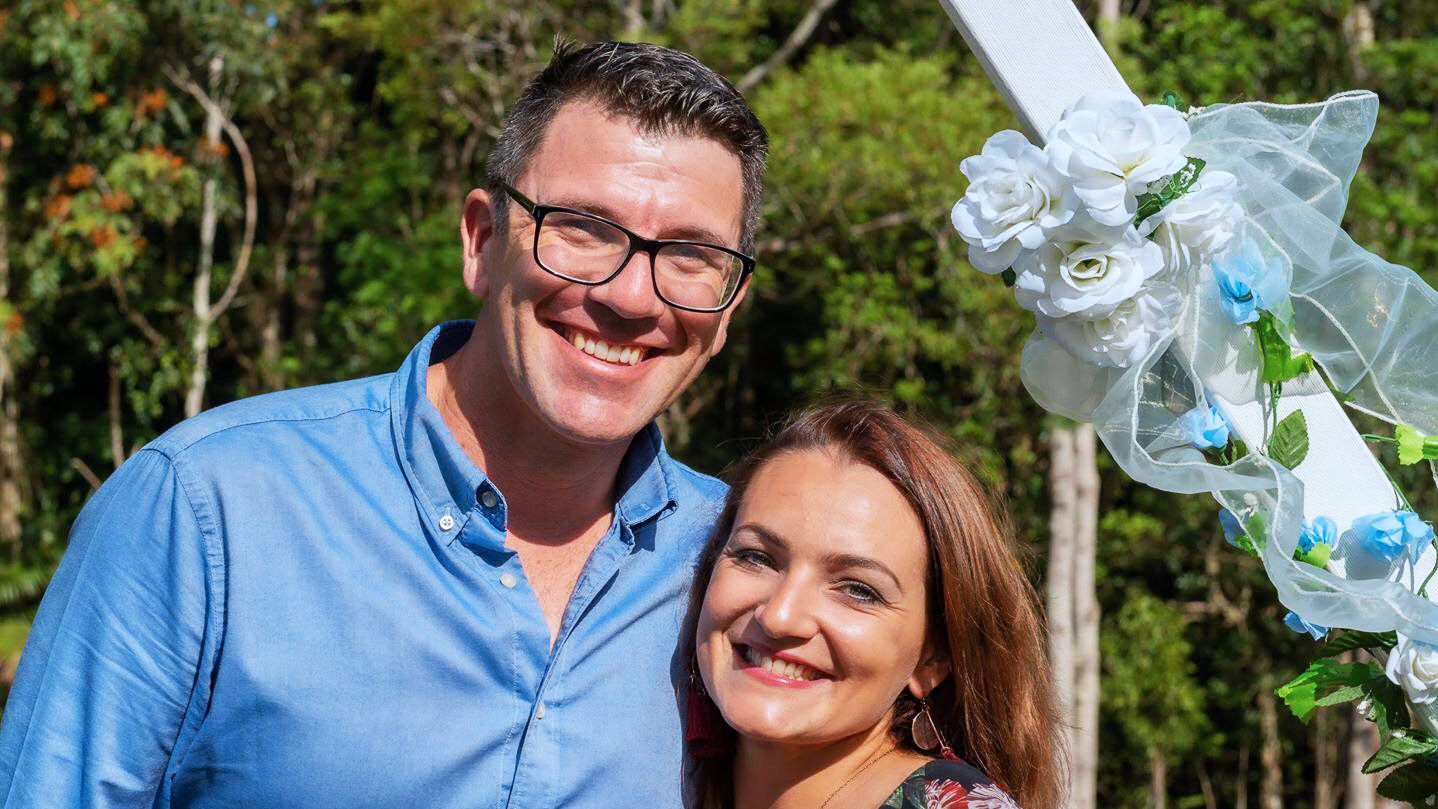
'Sophie Parkinson and her husband are the intended parents of the child Arina is carrying. Parkinson is scared she will not be able to get to Ukraine in time for the birth.'
Another Spanish couple, Gema García, 45, and José Antonio Sánchez, 39, made it into Ukraine for their child’s birth a week before the borders closed.
Garcia tried for seven years to get pregnant, once giving birth prematurely at 20 weeks to a baby who did not survive. Adoption is complicated, her partner adds in; surrogacy seemed the best option. They began the process in 2018 with a company called SurroBaby. Neither one could have imagined that two years later, they would be sitting in a rented apartment in Kiev with a new baby, afraid to leave their temporary home.
“We are in a foreign country, we don’t speak the language,” says Garcia. “This is a worldwide health crisis. We cannot leave the home here in Kiev. We are afraid that something will happen to us or to our daughter.”
Recent changes to surrogacy laws in Spain have made the process even more challenging. Parents must obtain Ukrainian citizenship for newborns before returning to Spain, says Sanchez. As he spoke, he turned the phone camera to show a baby girl sleeping in her crib next to him.
Two months after their daughter’s birth, after they were told passport service centers were working in a limited mode and that the new parents would not be able to obtain a passport for their child, the couple finally received the document and returned to Spain in early May. “We [were] counting the seconds until we [could] go home with our daughter,” the relieved father says.
Only a few weeks before Arina’s due date, the surrogate worries how pandemic protocols will impact her birth plan and what comes next. During her last pregnancy, the hardest part of her final weeks was the challenge of rolling out of bed with her expanding belly. With this pregnancy, coronavirus has left her in a constant state of distress but not all of it is for herself.
“I don’t want him to stay in the maternity clinic alone for a long time,” Arina says. After all, she’s only human, she adds. “I worry about the baby because it’s not his fault.”
*Name has been changed to protect subject's privacy.
Daniela Prugger and Oksana Parafeniuk are contributing reporters based in Kiev, Ukraine, with The Fuller Project, a nonprofit journalism organization that reports on global issues impacting women. Khushbu Shah also contributed to this piece.
For more stories like this, including celebrity news, beauty and fashion advice, savvy political commentary, and fascinating features, sign up for the Marie Claire newsletter.
[editoriallinks id='1ce6a6a2-6b7b-4e80-a3eb-b083d268c017'][/editoriallinks]
RELATED STORY
